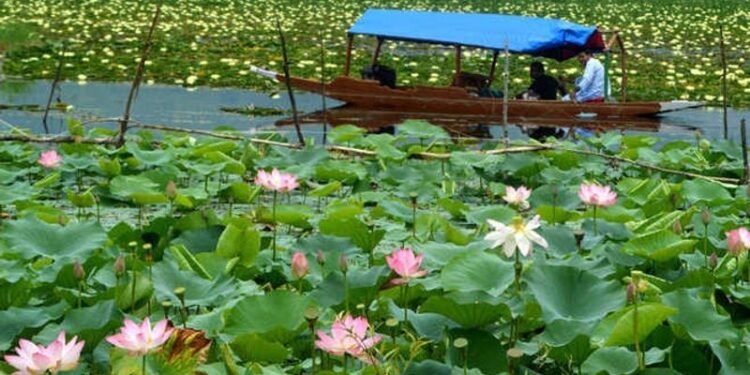Bandipora, Jul 12, 2025: For the first time in nearly three decades, Wular Lake—Asia’s second-largest freshwater lake—has witnessed the reappearance of lotus beds, signalling a major ecological turnaround after years of degradation and silt buildup.
A vibrant sea of pink lotuses now stretches across approximately 3 square kilometres of the lake in north Kashmir, thanks to sustained restoration efforts by the Wular Conservation and Management Authority (WUCMA).
“This is nothing short of a miracle,” said local resident Abdul Hameed, reflecting on the lake’s revival after the 1992 floods devastated its ecosystem and buried its rich aquatic vegetation under layers of silt.
Years of Damage, Now Reversed
The 1992 floods deposited vast amounts of silt across Wular Lake—spanning 200 sq km—suffocating its once-flourishing lotus beds, known locally for their edible stems, ‘nadru’, a prized delicacy in Kashmir.
In recent years, WUCMA launched a massive desilting operation, deploying Cutter Suction Dredgers to restore the lake’s natural depth and flow.
“As of July 2025, we have cleared over 80 lakh cubic metres of silt, reclaiming nearly five sq km of lake area,” said Irfan Rasool, Chief Conservator of Forests, Kashmir.
Zonal Officer Mudasir Ahmad confirmed that lotus seeds dispersed by WUCMA last year have successfully bloomed, aided by improved water quality and sunlight penetration to the lakebed.
Economic and Ecological Impact
With lotus beds back, locals are hopeful for the return of ‘nadru’ harvesting, a traditional source of seasonal employment for hundreds of families.
“It’s a blessing from God,” said Hameed, thanking WUCMA for its efforts and urging the public to safeguard the lake’s biodiversity.
The revival isn’t limited to lotuses. The improved water quality has also attracted a diverse array of migratory birds in the past two years, including:
-
Great Bittern
-
Falcated Duck
-
Horned Grebe
-
Western Reef Heron
-
Pallas’s Fish-Eagle
-
Common Pochard, among others.
“This ecological rebound is restoring Wular Lake as a crucial habitat for aquatic life and migratory birds,” said Rasool, adding that the efforts are a step toward sustainable conservation and community livelihood restoration.
As Kashmir’s natural jewel blooms once again, the success of Wular stands as a testament to focused ecological interventions and a renewed public responsibility to preserve nature’s legacy.



















